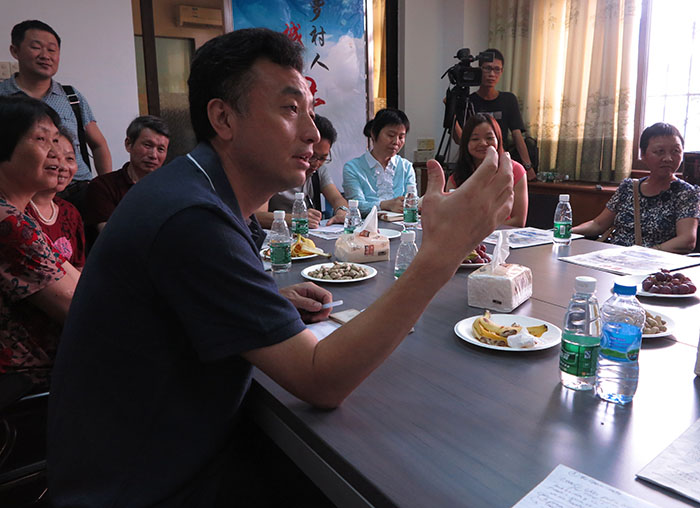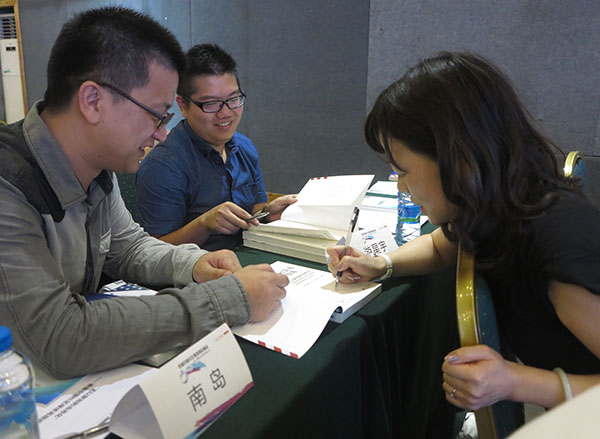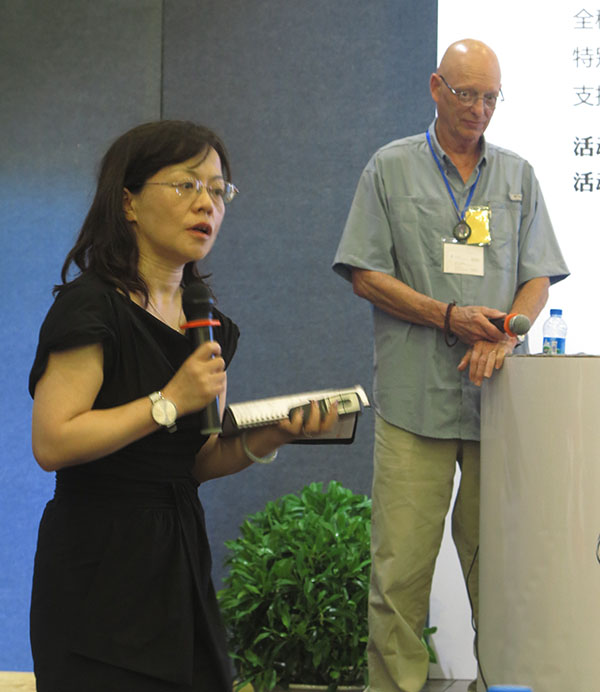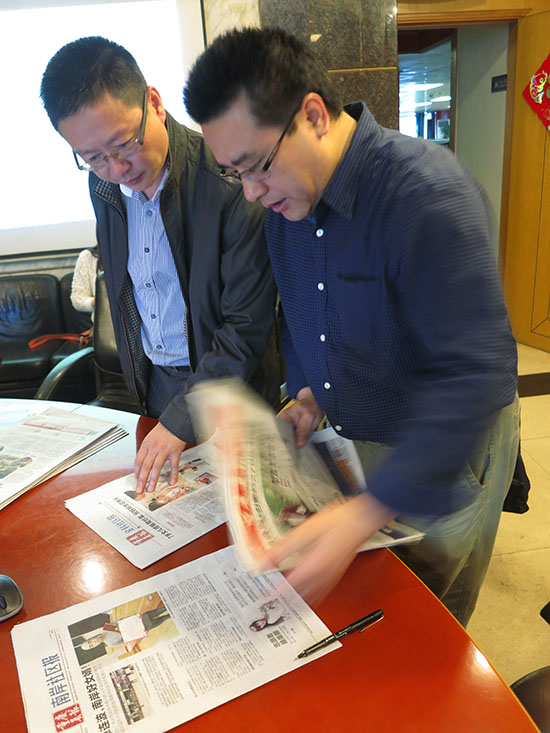
THE BACK STORY
Returning for his fourth time in as many years, UNC-CH Senior Lecturer Jock Lauterer is documenting a whirlwind two-week teaching gig to four cities in China where he will be advising community newspaper start-ups and helping to launch a community journalism program at a university in Foshan in the southern province of Guangdong. His latest book, the revised fourth edition of “Community Journalism: Relentlessly Local,” was published last summer in Mandarin. This blog is written expressly for his photo and community journalism students back at UNC-Chapel Hill, with whom he will be Skypeing later in March.
INTRODUCTION
“Every journey into China begins with gravitational pull…” — what American writer John Hersey defined as “the Call.”
Evan Osnos: “Chasing Fortune, Truth and Faith in the New China.”
Let me make this abundantly clear: China was NOT on my bucket list. I never wanted to go there. In fact, at an earlier age I felt like China was a country to be avoided at all costs.
But then, I felt the “gravitational pull,” and I heard “the Call.”
It all began so innocuously back in ’07: a Chinese scholar named Chen Kai stumbling across my first edition community journalism textbook in her Beijing university library — and having never heard of “community” journalism, wondering to herself “What’s this?”
Two years later, that same inquisitive Chinese professor would come to UNC to study under me, becoming my shadow, my academic colleague — and eventually my door to the Middle Kingdom.

Adopting the American “Karen” as her nickname, Prof. Chen Kai threw herself into a year’s study of some of North Carolina’s best community papers. With the goal of showing her our best and brightest, I took her from one end of the state to the other. Everywhere she went, she took copious notes, asked tough questions and charmed Tar Heel newspaper folk “from Murphy to Manteo.” Upon return to China in 2011, she published results of all that roadwork in a groundbreaking book in Mandarin titled, “Introduction to Community Newspapers in the USA: Small is Beautiful.”
Somehow, almost magically, that experience with “Karen” led me to apply for and win to a Fulbright Senior Scholar assignment and my first trip to China, spring 2012, when I spent two weeks teaching in Beijing “J-schools” — Renmin University, Tsinghua University and the Communication University of China — where, during one class I was introduced as “Mr. JOKE.”
If the shoe fits…
The two weeks was too short, but it was enough. I was hooked: the idealism of Chinese journalism students, coupled with the conundrum of how to teach journalism in a country denied a free press proved irresistible. Mr. Joke must return, this time for a total immersion.

Mr. Joke’s Reprise
Summer 2013. This time I jumped in the deep end. Five weeks and five cities from Shanghai to Hefei to Zhengzhou to Dengfeng to Chongqing gave me a more thorough taste of a 5,000-year-old country that cannot even trace its beginning to an actual single physical date in history! (The Chinese have no July 4th, 1776.) The country just always…was!
So how does a Westerner even begin to fathom such a country?
For guidance I looked to old China hands, both former U.S. Secretaries of State, Madeleine Albright and Henry Kissinger.
Albright opines, “China is in its own category…too big to ignore, too repressive to embrace, difficult to influence, and very, very proud.”
And from Henry Kissinger, who made over 50 trips to China and spent a lifetime studying the Middle Kingdom: “The U.S. and China need each other…because they are too large to be dominated, too special to be transformed and too necessary to each other to afford isolation. Beyond that, are common purposes attainable? And to what end?”
I began reading everything I could get my hands on, current newspaper reporting such as the excellent work done by embedded reporters from the Wall Street Journal and New York Times — as well as sources between hard covers. John King Fairbank, the revered Harvard scholar in his classic “China: a New History,” warns against stereotypical assumption about China: “Our libraries are littered with pronouncements of writers who knew all about China but could not see how much they did not know. The expansion of our knowledge has expanded the circumference of our ignorance.”
From travel writer J. Maarten Troost in “Lost on Planet China,” this admission: “Like nearly everything else I assumed about China, I was wrong.”
Troost follows with this declaration: “…you’re not going to understand this world if you don’t understand China…It’s where it’s all happening now…the next new thing is China. The center of gravity has moved east — business, finance, manufacturing, everything revolves around China.”
I think China, which as been described as being like the old Wild West, should be called “the Wild East.”

Welcome to the Wild East
And I would argue, the media is changing there too, at warp speed, with 316 million Internet users and an untold number of micro-bloggers. Newspapers, once only the domain of the party and under their thumb, have discovered that “there’s gold in them thar hills,” as the Gold Rush miners used to say: that the suburbs, and smaller cities represent an untapped advertising market. If ads are to be sold in smaller places, then local news, features and public affairs REPORTING must follow.
That’s my cue. How do we do that effectively in the U.S. of A? That’s what the Chinese editors and publisher want to know. OK, I can explain that, but how do you put that into Mandarin so they can understand?
Enter Prof Chen Kai again. Along with a sturdy crew of devoted students, she spent a year translating a revised fourth edition of my textbook, “Community Journalism: Relentlessly Local” into Mandarin.
The book was released last summer, during my third trip to China, which
took me from Beijing in the north to Chongqing in the southwest to Shenzhen in the south. This time, the focus shifted away from college students to industry professional themselves, the men and women in the trenches.
And there I met “other brothers from a different mothers” — in Chongqing, dear Professor Li Ren of Southwest University of Political Science and Law; and in Foshan, stouthearted publisher/Editor Guochen Li. I refer to them both in emails now as “Dear Younger Brother Li…” and they to me as, “Dear Elder Brother Jock.”
Wishing You a Happy Forever
As anyone who has ever traveled abroad knows, it’s not the government that makes a country memorable, nor even the scenery— which in China can be pretty spectacular. No, it’s the people who make a place heartfelt.
As I think about this Spring Break trip to China, my fourth in as many years, I re-read this email from Prof. Chen Kai (Karen) and am reminded how important this work is.
She writes, “Last week in my class my students didn’t know the difference between the word “citizen” and “resident.” That’s why community newspapers are critical for China, I think. A good system should be supported by matching beliefs, structure and people. If there are no responsible citizens, who can make democracy work? “
And from Editor Li, writing from Foshan in the south, this lovely essay, complete with Chinglish, which to me just makes it all the better:
My dear elder brother jock,
This time I sat at the window of my office, looking up to the biggest and round moon. Today is the traditional festival: the Moon Festivals.
At this time, I am thinking of my American brother professor Jock. How about you and your community newspaper teaching?
Somedays ago, I had read your article about your journey in china. I am really admire your care and patience. YOU found a lot of problems for our community newspapers. But you pointed out them so gently. These days I also read your book carefully and learn a lot new idea from you.
I hope you come to china another time .to give me some advice for my ten community newspapers.
This is a festival of reunion. I imagine that you are making tea with you family members. And I will Send the most auspicious blessings to your family, through the round moon.
Wishing you all healthy and happy forever.
Your younger brother guochen LI.
_____________________________________________________

